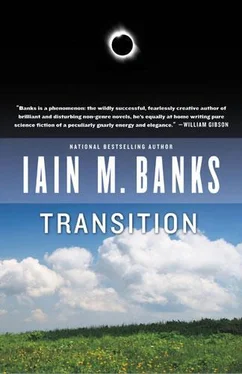“I’m already intrigued.”
“Well, you would be.”
“How do you know all this?”
She waggled her toes over his penis as though it was a flute and her feet were intent on playing it. “I seduce forecasters. I’ve even turned a few. I have my own now.”
“Uh-huh.”
“The Concern use you, and others, to do this sort of thing more and more these days, Tem. You still get to kill the genuine bad guys now and again, but that’s become little more than cover now, not the main focus of their activities. They’ve even started going after people who’re just thinking about what humanity’s true place in the cosmos might be. There’s a guy called variously Miguel Esteban/Mike Esteros/Michel Sanrois/Mickey Sants who keeps cropping up across one batch of worlds. All the poor fucker wants to do is make a film about finding aliens but they’ve started kidnapping him too now. That’s one of the few examples we know about. I’m betting there are hundreds of others.”
“This is all back to Madame d’O, isn’t it?” he said, gripping the rim of the tub and flexing his shoulders to ease his hips forward, closer to her, so that her legs spread a little more, glistening knees appearing out of the surface of the gently bubbling water on either side while her soles and toes still grasped his cock.
“Madame d’Ortolan continues to believe in her imbecilic theories and pursue her sadistic research,” Mrs Mulverhill agreed graciously.
“It just always seems more personal,” he said, “this thing between her and you.”
“I’ve no particular desire to personalise any of this, Tem, it’s just that when you follow the relevant trails she’s always what’s waiting at the end.”
“No doubt.” He reached forward, took her ankles in his hands. “And now I think you should come over here.”
She nodded. “I think I should, too.”
The dawn began to break across the teeth of the eastward mountains, a yellow-pink stain slowly spreading. They stood, bundled in pillowed layers of high-altitude, four-season clothing, on a high circular balcony situated on the summit of the highest dome of the great empty palace. They were in the open air, beyond a small airlock, sucking oxygen from transparent masks over their noses, leaving their mouths free.
Small oxygen tanks in their outer jackets kept them supplied with the life-giving gas and a back-up system of valves dotted round the balcony stood ready to replace those if something went wrong. Even so, one could not simply step from the scented sea-level warmth of the palace into the open air of nine and a half kilometres above the ocean; the pressure difference was so great that a period of adjustment was required in the airlock to prevent discomfort. Before dawn, when the air was most likely to be still, was the best time to be here. Nevertheless, a strong, thin wind was blowing from the north. A movable glass screen linked to a man-high tail of a blade like a giant weathervane had positioned itself to deflect the worst of the blast over the balcony. Glowing figures on a small screen set into the parapet indicated that the temperature was forty below. The air, felt on the lips and the few square centimetres of exposed skin around the eyes, seemed powder-dry, sucking up moisture as much as warmth.
She said, “People will generally make whatever compromises with the world they think necessary still to convince themselves that they are the most important thing in it. The trouble with what we’re able to do – specifically the trouble with unfettered access to septus and through it to the many worlds – is that it abets and encourages this delusion to the point of naked solipsism.” Her voice, carried over the steady roar of wind, sounded calm and strong, unaffected by the thin air.
“All the same,” he said, “it’s still an illusion. The world exists without us, whether we like it or not.”
She smiled. “A hard-line solipsist would dismiss your words as mere wind,” she said. “The point is that to a true solipsist there is no distinction between objective and subjective truth. Subjectivity is all that matters because it is effectively all that exists. And to be a member of the Central Council of the Transitionary Office is to exist in a state that positively encourages such a state of mind. It is not healthy, not for the Office, l’Expédience, or for anything or anybody.”
“I’d have thought it was very healthy indeed for those on the Council itself.”
“Only in the trivial sense that now they need never die.”
“I bet it doesn’t seem trivial to them.”
“Well, quite.” Mrs Mulverhill sat back against the balustrade, its curved top fitting into the small of her back within the puffy layers of insulation. Her outer wear was white. The slowly increasing light to the east washed it with a chilly pinkness. “But one has to ask what this has done to their outlook.”
“I cannot wait for you to tell me,” he told her.
She smiled. “Unless we have been lied to even more comprehensively than even I suspect, the Concern has existed for a thousand years. In that time, certainly for the first eight centuries, it spent its time investigating the many worlds, researching the properties of septus and the abilities it confers upon people trained to take it, and theorising regarding the metaphysical laws governing the many worlds and the composition of whatever context they might be said to exist within. Until about two hundred years ago, interventions were rare, much argued and agonised over, heavily monitored and subject to extensive subsequent analysis.”
“So what happened two hundred years ago?”
“Madame d’Ortolan happened,” Mrs Mulverhill said, with a sour smile. “She discovered how a transitioner could take somebody else with them between the realities and that opened up a whole new set of opportunities for l’Expédience; the numbers of worlds investigated soared. Then when she was on the Central Council she pushed for a far more aggressive policy of interference and a still wider spread of influence. She also proposed that the practice of allowing Central Council members to shift down to a younger body when their own body approached advanced old age become the default for all rather than the extraordinary privilege for the most-honoured few, and that the limit of this being allowed to happen only once be lifted.”
“I thought that was still just a proposal.” It was a rumour throughout the Concern, indeed across Calbefraques, that this might be the case, but there had been no official pronouncement.
“In theory it is,” Mrs Mulverhill conceded. She turned and looked out at the nearby peaks starting to shine like vast pink teeth all around them. “But it’s being done piecemeal. As each of the other Council members approaches the age when they might start to think that such a proposal does make sense after all – when they have often spent their careers until then decrying and opposing it – the good Madame suggests they might like to reconsider. To my knowledge only two of the Council have resisted her so far, and they might still be persuaded.” She looked at him and smiled. “The steps to the grave grow steeper the closer you approach. A degree of urgency can grip people. She might have those two Council members too, in time. And besides, with them gone and with effective control over the Central Council, she can make sure the replacements are more amenable. She has all the time she wants, after all. She can play the longest of games.”
“So now the Central Council just goes on for ever?”
“As an entity, it always expected to.” She shrugged. “Well, bureaucracies always do, but this one really might, of course. The difference is that in theory the individuals of the Council can now go on for ever. The point is not that the Central Council will never cease to be, the point is that the Central Council will never cease to be exactly the same. It will never change.”
Читать дальше












